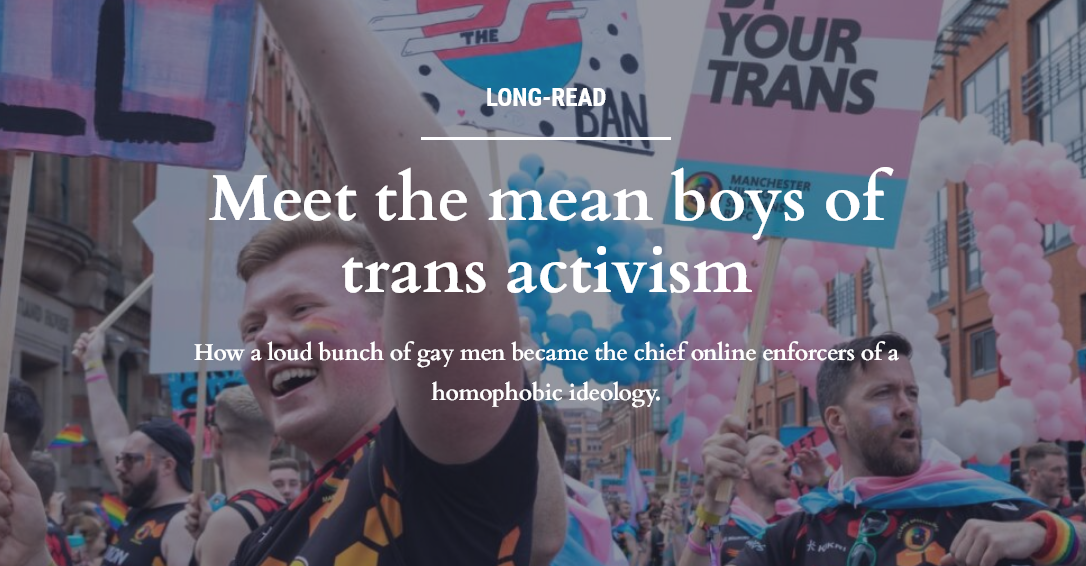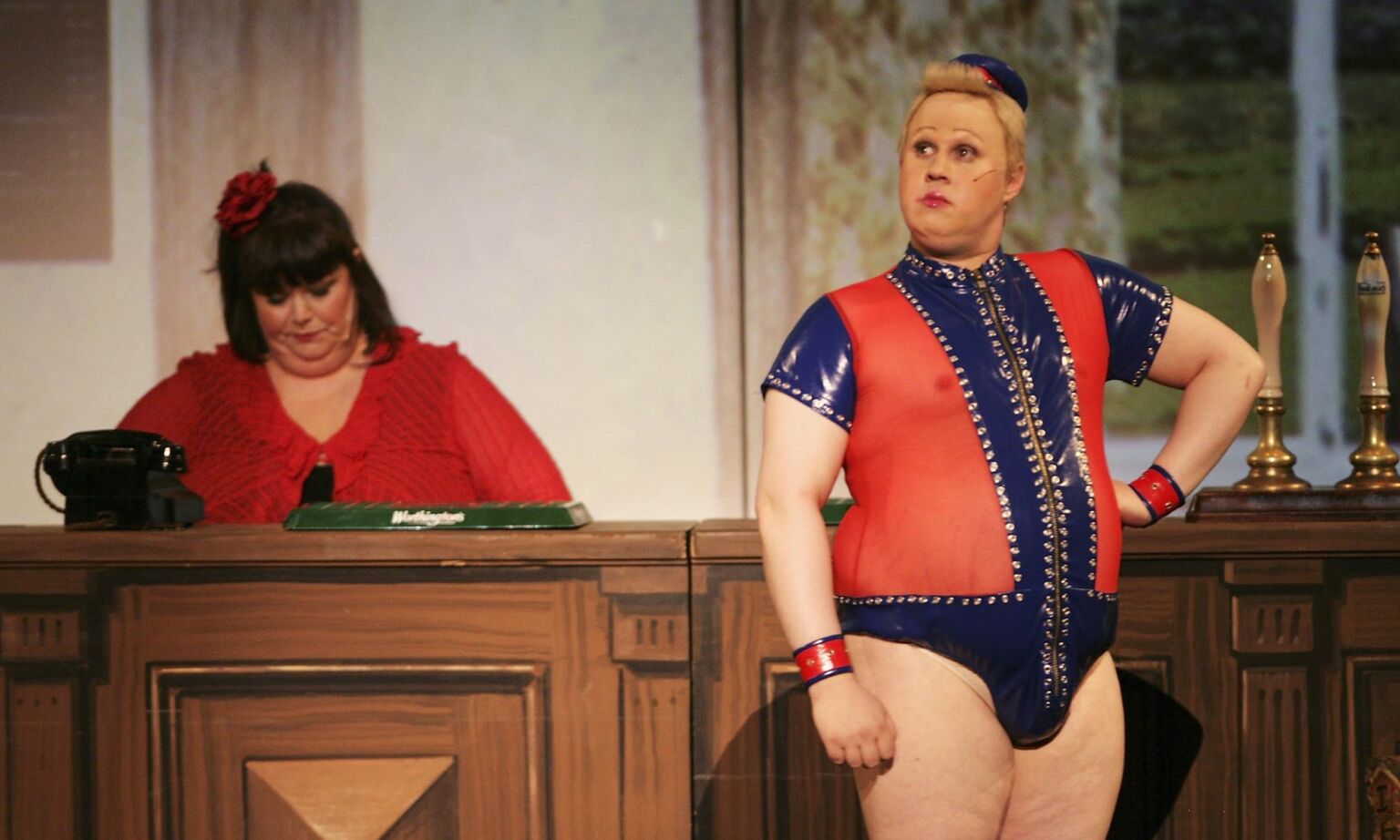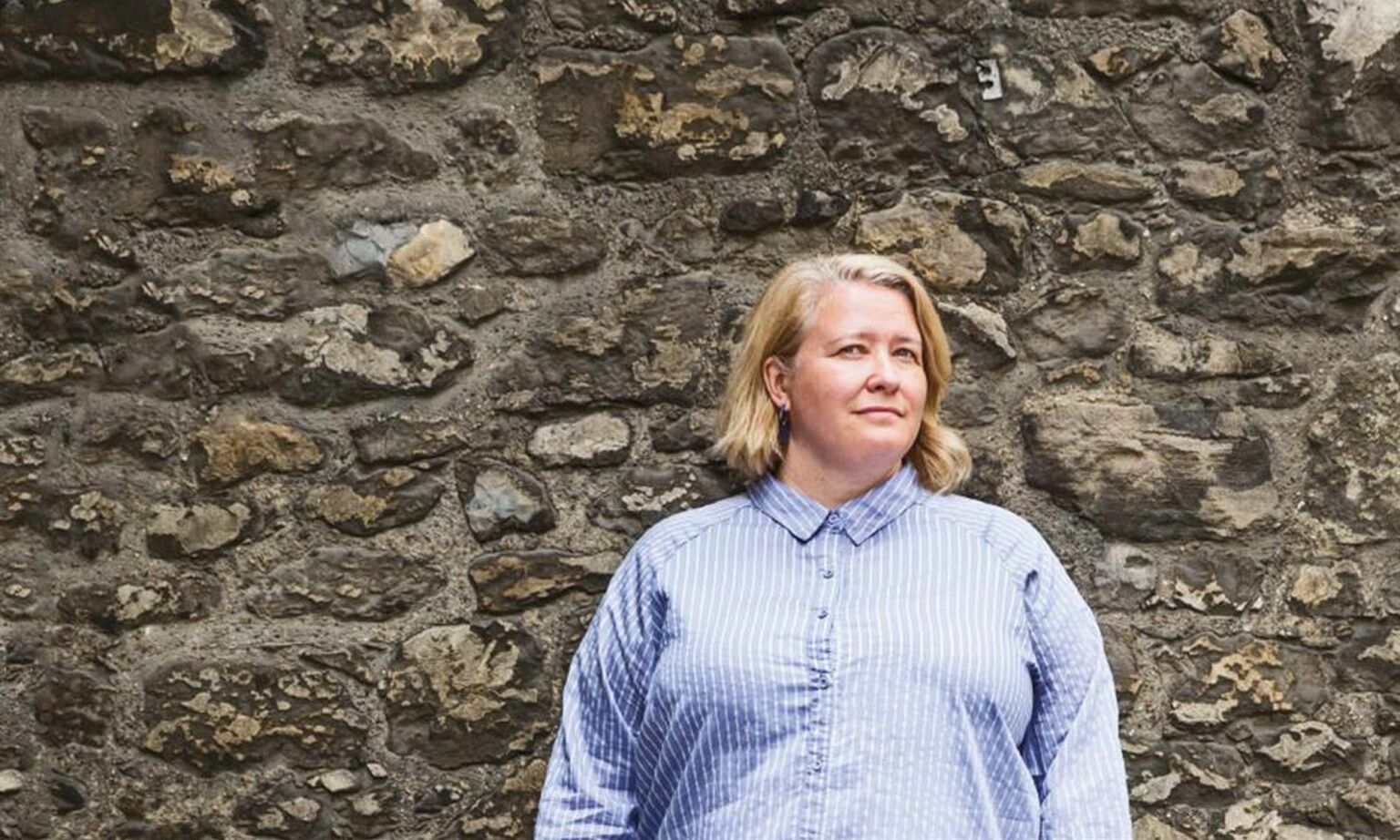
There was always a contingent in the gay male world of what we might call the ‘uh-oh’ men. These were self-dramatizing, hysterical Western gay men who, like loosed battery hens who run back into their batteries, found their new-found freedoms very difficult to live with. And so they took it upon themselves to dole out summary justice on the rest of us and the world.
We see them depicted in gay male culture before the advent of trans ideology. David Sedaris captured a perfect example in his satirical piece, ‘Glen’s Homophobia Newsletter Vol 3, No 2’, collected in Barrel Fever (1994). Glen is an utterly selfish, narcissistic nightmare who uses the language of gay rights and the shield of his ‘identity’ to cover – badly – for his terrible personality and actions. Another example was the character of Dafydd, the ‘only gay in the village’ in mid-Noughties BBC comedy Little Britain. Like many of the jokes in that series (now widely disowned by the creators for whom it made millions of pounds), the humor came from pointing out that society had moved on. Dafydd was an exhibitionist neurotic stuck in the Eighties, a self-saboteur living in a culture in which nobody else much noticed or cared about his sexuality. Nobody knew then that Dafydd was not the past but the future.
The cause of trans rights and gender ideology – or “genderism” – gave these ‘uh-oh’ gay men new purpose and drive, and it brought out hidden ‘uh-oh’ tendencies in others. Suddenly, there was something shiny and new to fulminate and froth about, something fresh to pin their awful anger and their need to punish and control. And Twitter, now known as X, was the perfect arena to do it.

Matt Lucas performs as Dafydd in ‘Little Britain’s Big Night’ charity gala performance, at the Hammersmith Apollo, 22 November 2006.
These men are conspicuously not very bright. They consider it likely that lesbians and gay men of the left who have spent decades fighting for gay rights all suddenly decided to become far-right haters of effeminate men and butch women one Wednesday afternoon in April 2015. They rant and rave about standing with their ‘trans siblings,’ failing to notice that a very significant proportion of that cohort is heterosexual men who merely enjoy cross-dressing and, or gatecrashing lesbian speed-dating events. They have somehow overlooked the well-evidenced fact, backed up by the Cass Review that girls and boys who don’t conform to sex stereotypes are being led down the path of chemical castration and mutilation. All of this counts for nothing because it interferes with their Napoleonic levels of self-regard and the opportunities that the toxic combination of social media and gender ideology gives to their appalling flaws.
They love the righteous sensation of denunciation – swallowing and parroting the gender rubbish not for what it actually says but because it gifts them the instant, unquestionable moral authority of the curtain-twitcher.
These people don’t want equality. They don’t want to be ignored, left alone to live their lives. For whatever psychologically damaged reason of their own, they want revenge, dolloped out to whoever they think deserves some. Such revenge is fun for broken people, which is why others like to join in. It’s a game anyone can play without qualification, like Shrovetide football or the Euromillions.
Joining them are the so-called ‘allies’—individuals lacking education and similarly aggressive natures seeking to join in on the conflict. The term ‘allies’ has evolved. Nowadays, when hearing about the Allies in a documentary about World War II, it’s difficult not to imagine a group of privileged individuals with average grades from a mediocre university advancing through the desert with disdain, shimmering with glitter and wearing rainbow lanyards.
Gay male enforcers and their straight allies alike rely on a very limited lexicon when they, in that grim tabloidese phrase of our times, ‘take to Twitter.’ They have no concept of making a case or advancing an argument rationally. They try to shut you down by saying, ‘Just be kind’. (When someone feels the need to conspicuously inform you how nice and compassionate they are, run like the wind.) They respond to opponents with slogans, a mini-vocabulary of clichés. As barrister Dennis Kavanagh has pointed out, ‘They have about seven or so template arguments. They have about five template personalities. They have about ten permitted thoughts.’
Many of the slogans used by genderists lack depth and significance, such as ‘love is love.’ However, it is essential to analyze other slogans to understand their purpose. These slogans reveal the vulnerabilities in the genderist belief system, as genderists feel the need to reinforce specific concepts through repetition continuously; this shows that they are aware of the weaknesses in their arguments.
Let’s start with the robotically repeated phrase, ‘transwomen are women.’ The gay men and their allies deploying it don’t believe it. Nobody does. The less-committed brethren say it because they are afraid not to say it. The full-blown votaries say it to make the less committed fearful of not saying it. It is a public pledge of loyalty. It is said as a marker to prove your obedience to the high-status group, to demonstrate that you are willing to parrot any absurdity. It signals to your masters that if it became expedient to state that the Sun is the Moon or that cats are dogs, you would do it. You are no trouble. You will do as you are told. It holds a sign that reads, ‘Please don’t hurt me.’ It’s the secular version of the Blood of the Lamb over the lintel.
It’s been fascinating to see gay men go along with this meekly, like rainbow sheep corralled by a transgender border collie; a plain absurdity with obvious, massive implications was added to the cache of ‘progressive opinions,’ which they absorbed in moments. I’ve lost count of the gay men of my acquaintance (none of them, thankfully, were actual friends) who were conspicuously naughty in the Noughties but who now have pronouns in their Twitter bios and expound on ‘transphobia’ and ‘TERFs.’ When, back in the day, a gay man I knew began a relationship with what we might now call a ‘trans man,’ the two of them thought it was the funniest thing since Sixties’ music-hall star Tessie O’Shea picked up her paper bag. To a tedious amplitude, they bombarded our circle with jokes and memes on the topic. They were two of the first conspicuously to clamber onto the transgender bandwagon a few short years later, publicly policing and judging and shaming everybody else and giving no quarter to the slightest doubt or passing humorous observation. As American writer Shant Mesrobian observed a few years ago:
“The reason why so many extremely woke people turn out to have been bigoted in the past is because bigotry used to be the best way to bully and intimidate people, but now performative anti-bigotry is the best way to bully and intimidate people. An evolving toolset for sociopaths.”
Another favorite phrase of the genderists is ‘our queer community.’ This boilerplate term ascribes unity and universality to a rabble that heterosexual men dominate. They often describe dissent as ‘hateful rhetoric,’ as if they’ve just heard a speech from a Nuremberg rally, when in fact it was beloved children’s author JK Rowling saying men shouldn’t be allowed in women’s refuges. (Genderists’ misuse of the word ‘hateful’ when they mean ‘hate-filled’ is also very irritating.)
Then there’s the tendency of this woke cohort to accuse their detractors of issuing ‘dog whistles.’ They do this when they’re dumbfounded and cannot find anything to object to in what has been said. So instead, they act as if they have the gift of telepathy, reading not only between the lines but into other people’s minds to see the evil hidden within statements such as Rowling’s ‘Live your best life in peace and security.’
Other common slogans among mean boys disguise their cruelty in righteous terms. So, getting people fired is merely ‘holding them accountable.’
Then there is the oft-repeated claim that ‘nonbinary people have always existed.’ This particular shriek is always very telling, throwing back into the unknowable past, something that was invented on Tumblr in 2011. Related to ‘nonbinary people have always existed’ is the accusation leveled at critics of gender ideology: ‘You are saying that trans people do not exist;’ this is the peculiar idea that if you refuse to take someone at their own estimation, then they disappear. There is also much misquoting of jokes and sarcasm without context and in transparent bad faith.
The mean boys often twist criticism of ideas into accusations of hatred towards specific groups. For example, disagreeing with gender ideology is falsely equated to hating transgender individuals, a misleading tactic. Additionally, it is quite amusing to see British activists adopting American colloquialisms, like ‘trans folk,’ in their arguments. It almost feels like characters from “Little House on the Prairie” attempting to sound sophisticated. While I may be exaggerating slightly, the use of such language only serves to diminish the weight of the conversation at hand.
Genderists are also forever fantasizing about ‘well-organized’ and ‘coordinated’ campaigns against them. It seems that only slapdash, ill-planned strategies are acceptable. If people organize to be effective – and many of the grassroots sex-realist organizations have won victories against the odds and at significant personal and financial cost – it’s automatically sinister.
Frequently following on from this assertion is the even more outlandish one that sex realists are ‘well funded’ by ‘dark money;’ this is a typical cry, always unsubstantiated, from nuttier people on all sides of the political spectrum, from President Trump and his rump to the Remainders of the Brexit debate. They all share a refusal to accept that their opponents’ ideas might have a genuine appeal. Those sticking up for biological reality are very often accused of being funded by the American evangelical Christian right. The cheques are presumably still in the post.
This particular delusion reached its nadir when Nancy Kelley, then CEO of Stonewall, tweeted in March 2023 the totally unevidenced assertion that ‘the anti-gender movement’ – i.e., gay-rights campaigners opposed to her – ‘has been funneling cash and strategy into countries around the world for decades’ and that the increased legal prohibition of homosexuality in Uganda, a terrible thing, is ‘“winning” for them.’

Nancy Kelley, chief executive officer of Stonewall from May 2020 until July 2023, pictured in London, 2023.
Cash? For decades? Most of us are struggling financially, and we have only recently started paying attention to gender issues in 2015. If I had any extra funds, I would use them to hire someone to install a new boiler, Nancy. Influencing the laws in Uganda would not be a top priority for me, and implementing the death penalty for Ugandan homosexuals would be completely unacceptable.
The Twitter enforcers have been particularly awful regarding the hounding of the homespun LGB Alliance (funded entirely by public donations). They frequently describe this minor assembly of lesbians and gay men as a ‘far-right hate group’ – although many of them have been gay-rights campaigners for decades. Some were actually prominent in Stonewall before it became a trans-rights lobby group. The uh-oh men and their allies started tweeting this before the LGB Alliance even had a name. All it took was for barrister Allison Bailey to tweet that she’d met with some mates to discuss setting up an exclusively LGB campaign group, and genderist social media erupted with accusations of a new Kristallnacht. (A reminder here that Bailey is a black lesbian criminal-defense barrister with a lengthy history of advocating for racial equality and representing the survivors of domestic violence and sexual abuse. An unlikely Nazi, you would think.)
There is a silver lining to be found in this situation, revealing a significant flaw not just in the actions of individual gay activists like X but in the broader trans-activist movement as a whole. Their narrow-mindedness results from being blinded by their rigid ideology; this is evident in their constant regurgitation of slogans and inability to engage with opposing viewpoints. Rather than facing the actual challenges presented by their opponents, they instead create a fictional enemy in the form of imaginary Nazis to avoid disrupting their carefully constructed worldview.
This means they could be more decisive regarding strategy and advance their arguments convincingly, so they resist debate, shame, steamroller, and talk in mantras. They are like a motorist trying to navigate the one-way system of Leeds using a map of the Kalahari Desert. When and if – and with the broadcast media still largely putty in the hands of genderism, that’s a big when and a mighty if – the public gets to see the reality of groups like the LGB Alliance, their detractors will immediately look utterly deluded and deranged.
By contrast, sex realists know precisely who the other side is. Better, it seems, than they do.
Gareth Roberts is a screenwriter and novelist, best known for his work on Doctor Who.
This is an edited extract from Gareth’s new book, Gay Shame: The Rise of Gender Ideology and the New Homophobia, published by Forum.
Source : https://www.spiked-online.com/2024/04/28/meet-the-mean-boys-of-trans-activism/
Share this content:






